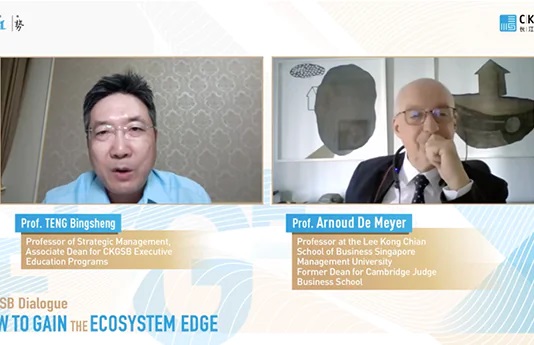In a bid to prevent users from venturing out of their proprietary environment, Alibaba and Tencent are aggressively adopting a walled garden strategy.
In last year’s movie The Edge of Tomorrow, Tom Cruise’s character is forced to repeat the same day over and over again in a fight against aliens bent on taking over Earth. In the 1993 movie Groundhog Day, Bill Murray’s character also had to repeat his day many times although under less stressful circumstances. When it comes to technology platforms, I sometimes feel as if we are living the same day over and over again.
Back in the 1960s, American Telephone & Telegraph (AT&T) did not allow “foreign” devices to connect to its telephone network. AT&T had a monopoly on telephone calls in the US and argued that a device it did not manufacture might endanger or degrade its network. Although some devices posed a threat, most were harmless. In these cases AT&T’s motivation was to extend its monopoly control of the phone network to the related equipment market. AT&T had a subsidiary called Western Electric devoted to making and selling equipment and could capture the margins on equipment through it (AT&T’s prices were regulated but equipment margins were higher than those for phone calls). Perhaps more importantly, AT&T wanted to prevent an alternative to its network developing as later happened with wireless and computer networks.
AT&T’s strategy worked until an inventor named Thomas Carter challenged it by petitioning the Federal Communications Commission (FCC), the industry regulator. He had invented a device called the Carterfone that allowed a two-way radio to connect to the phone network. This was useful in locations without phones (these were the days before cellphones). For example, an oil rig worker could use his two-way radio to call another radio which an operator would patch into the phone network allowing the worker to call anyone with a phone. In 1968 the FCC, facing pressure from the emerging computer industry that wanted to move data over the phone network, sided with Carter and declared that AT&T must allow any safe device to interconnect. This led to a flood of independently-manufactured devices including phones and computer modems.
Fast forward to 1998 and a company called America Online (AOL) is the world’s largest internet service provider with a 55% share in the US.[1] Part of AOL’s strategy was to keep its customers within a “walled garden”. Although the broader internet was public, AOL tried to keep its users within its proprietary environment by controlling the home screen they saw when logging in (these were the days of dial-up internet so users had to log in each time they connected) and providing its own content, e-commerce, email, and chat services. It was a successful strategy: users spent 40% of their time on its e-commerce, services and content; 23% on its email; 20% on its chat; and only 17% on the public internet.[2]
AOL had the same goal as AT&T: reduce the substitutes for its product so as to keep its margins high. While AT&T tried to protect its self-contained environment through regulation, AOL did so by reducing users’ transactions costs. It was easier for users to get everything from AOL than to visit many different outside services. AOL succeeded with this strategy for many years. It was undone by the widespread adoption of broadband internet. Broadband internet speeds were much faster than AOL’s dial-up service allowing users to easily search across the public internet and “bundle” disparate services on their own.
Fast forward again to the present and two internet firms are trying to repeat the “walled garden” strategy in China. Tencent is expanding its WeChat messaging system into a broader mobile platform. From within WeChat users can now read news, go shopping, play games such as “Airplane War”, watch NBA basketball games, share videos and photos on the “Moments” social media function, and pay for merchandise and services through a built-in payment function. Just as AOL was trying to keep users from using the public internet on their desktop Tencent is attempting to do the same on mobile phones. Pony Ma, Tencent’s CEO, hinted at this during the company’s 2013 annual earnings conference: “We’ve enhanced our leading WeChat app from a communication tool to a multi-functional platform through initiatives such as smartphone games, official accounts and payment functions over the past year…. All of our businesses are based on the WeChat platform, and we are confident that they will generate great returns in the long run.”
Tencent’s competitor Alibaba is attempting the same. Alibaba has long had its own e-commerce sites Taobao and Tmall and payment system Alipay. Since 2013 in a bid to keep users within its own “walled garden”, Alibaba has invested in companies in mobile gaming (Kabam), mobile messaging (TangoME), video content (Youku Tudou), music content (Xiami), taxi-hailing (Kuaidi Dache), social media (Weibo), and mobile browsing (UCWeb).
Just like AOL, Tencent and Alibaba want to keep users within their own proprietary environment and prevent them from venturing out into the public internet using their mobile devices. This goal has led them into an “arms race” to acquire more and more services. If one or the other succeeds, the payoff could be enormous as it was for AT&T and AOL in their time. However, the firms need to be careful. As AT&T and AOL discovered, unexpected technological changes can break through these “walled gardens”. Moreover, the three cellular phone companies in China ultimately control what can run on a mobile phone and if Tencent or Alibaba become too powerful, they could respond by limiting or charging more for their access. While the Tom Cruise and Bill Murray characters had the chance to improve their performance in each successive repeat of their day, Alibaba and Tencent won’t get a second chance.
Update: Another recent event points out the perils of unrelated diversifications—an issue I originally discussed with Wisco’s move into pig farming. Cloud Live Technology Group recently defaulted on bond payments.Cloud Live was originally Beijing Xiangeqing and operated a chain of restaurants. It subsequently decided to shift into cloud computing and change its name.
[1] Michael P. Wallace, Sara J. Zeilstra, and Maynard J. Um, “America Online: Still the One to Own,” Warburg Dillon Read, June 30, 1998, page 30.
[2] According to AOL’s estimates (Wallace, Zeilstra, and Um, “America Online: Still the One to Own,” page 30).




















